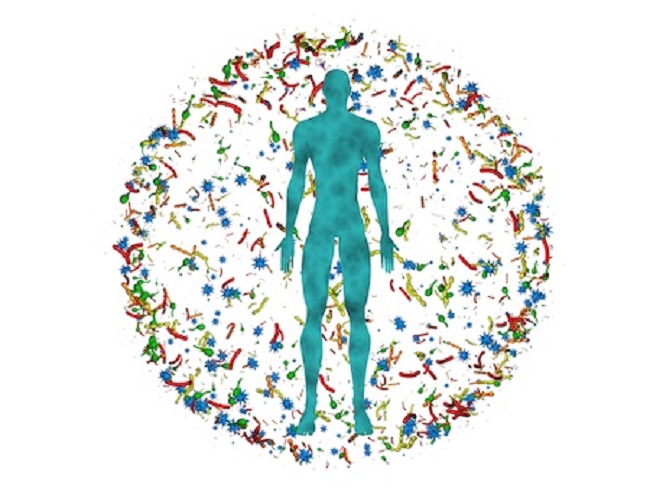Human beings live in a world where they are under continuous attack. In this post, I will outline the nature of the attack and how we defend ourselves.
Homeostasis
The prefix “homeo” means “the same, steady”, and the definition of homeostasis is “the tendency towards a relatively stable equilibrium between interdependent elements, especially as maintained by physiological processes”. Although we are surrounded by bacteria and viruses that are ready to attack us, generally speaking we remain healthy. We can assume that the body’s capacity for maintaining health has adequate energy to maintain homeostasis. That must mean that we are defending ourselves continuously, but any form of imposed stress, such as an infection, demands a surge of energy to meet it. The miracle of being alive means that our defensive machinery is always operating automatically. The body consists of between 70 and 100 trillion cells, each having a responsibility in its own right. We exist because we have inherited a code from our parents called DNA. If this is in a perfect state, all that is required is food to supply energy. The defense is referred to as “an illness”.
How We Defend Ourselves From Infection
As an illustration, I am going to use the form of a typical attack referred to as a streptococcal sore throat, whose technical name is “acute febrile lymphadenopathy”.
Why does the throat become sore?
As we all know, because of inflammation. This is a defensive process because the inflammation is an attempt to block the passage of the bacteria into the body.
Why do we get swollen glands in the neck?
The swollen glands are known as lymph nodes. They become enlarged because it is an attempt to capture and destroy the bacteria as they pass from the throat into the body.
Why do we develop a raised body temperature?
As we all know, the normal body temperature is 37° C. This is the temperature at which bacteria are at their most efficient state. By raising the body temperature, the efficiency of the bacteria is reduced.
The Brain and the Inflammatory Reflex
We now know that inflammation is under the control of the brain. It sends signals through the nervous system that is known technically as “the inflammatory reflex”. In fact, the entire defensive system is under the control of the brain, as is illustrated by a case that I have already described on this forum, but bears repeating.
Years ago, I was confronted by the case of two boys, both of whom experienced recurrent acute febrile lymphadenopathy. Of course, they had been treated by repeated antibiotic therapy, even though any form of infection had not been proved. Cutting out the technicalities involved, I was able to show that both of these boys were deficient in thiamine, leading to a reduction in brain energy. Each of these two boys had been indulged throughout life with an ad lib ingestion of sweets. It was probably responsible for the thiamine deficiency. Again, without going into the necessary technical factors, the lower part of the brain that controls the defensive machinery becomes unduly sensitive from the energy-deficiency caused by the insufficiency of thiamine. What was really happening was that the part of the brain that controls the defensive machinery had become hypersensitive. It was reacting to a variety of otherwise harmless environmental stimuli under the false Impression that an Infective microorganism was the stressor. There were other factors that supported this explanation, but they are highly technical and inappropriate for this post. The case was published in the medical literature.
It is not easy to understand that the acute febrile lymphadenopathy in each of these 2 boys was really a perfectly appropriate defensive reaction to non-existent bacterial attack, if such an attack had been the reality. If we acknowledge that bacterial invasion of the body is a form of stress, we are supporting the conclusion that “stress” requires a surge of brain energy to operate the defense. This is true for any form of stress, including trauma and mental action.
Because lack of oxidation had made the brains of these boys hypersensitive to any form of stimulus, they must have been overreacting to the perception of some form of environmental stress under the false Impression that it represented a bacterial invasion. Of course, we cannot know if this is the truth, but all the biochemical studies supported this explanation of the observed facts.
Genetics
The perfect structure of the human body is undoubtedly the ideal. It would mean that we had inherited a perfect genetic code in DNA. It is unlikely that perfection in structure is ever achieved in any of us and that we each have a share of genetic mistakes known as polymorphisms. These are not sufficient to cause disease on their own, but perhaps they introduce genetic risk. Another factor may have to play a part. For example, type 1 diabetes has a gene or genes in its background. But the disease does not emerge until later in life, often after a minor stress such as a cold or injury. If the gene(s) were the sole cause, the symptoms of diabetes could be expected to appear at birth. What I am hypothesizing is that a breakdown in health requires more than a single factor. We have indicated that Imperfect genetics is one factor and some form of stress is another.
Nutrition and Malnutrition
We have indicated that a surge of energy is inevitably required for the automatic machinery to go into defensive action. That comes from our food whose efficiency in synthesizing that energy comes from two distinct parts. The first part is called calories and the second part is known as non-caloric micronutrients. Mother Nature “knows” the exact proportion of each part of the food. We do not! Is it not obvious that our food has to be that supplied only by MN?
Because the brain is the organ that needs the largest amount of oxygen, it quickly reacts to a mild insufficiency by producing a variety of sensations called symptoms. It is almost as though the brain is trying to warn its owner that it is lacking energy. Of course, the trouble with that is that the cause has to be interpreted in practical terms. The lower brain that controls the autonomic nervous system (ANS) is highly sensitive to oxidative deficiency, so the many symptoms experienced by the patient come from dysregulation of that system. For example, a common symptom is heart palpitations. The explanation for them often given by the physician, is that it is from “heart disease”. Dysfunction of the ANS is not considered. A series of laboratory studies found to be abnormal in heart disease are applied. Abnormal laboratory results are essential to the present concept of “real disease” and when they are found to be normal, the interpretation of the palpitations is that it is “psychosomatic”. Unfortunately, there are millions of patients who go through a series of specialists seeking an answer to their multiple symptoms. Each specialist gives an answer that is governed by current diagnostic concepts or their particular specialist status. Some of these unfortunate patients have recorded their experiences by posting on Hormones Matter and anyone seeking help may find the solution in one or more posts that address this problem.
Chronic Illness and Covid Longhaulers
Consider this. An attack by ANY microorganism is a “declaration of war”. There are only 3 outcomes: the microorganism wins (death), you win (cure), or there is stalemate (chronic disease). The brain is responsible for organizing and controlling the defense. If its inherited construction is perfect, all it requires is energy. Probably a perfect DNA never occurs and many, if not all of us, have gene defects known as polymorphisms that are insufficient to cause disease on their own. Epigenetics tells us that genes (say, polymorphisms) are influenced by nutrients. Any form of “stress” (a nasty divorce, a deadline, surgery, even an inoculation) demands a surge of energy to meet it. I suggest that “Longhaulers” after Covid-19 are suffering stalemate. Thiamine and magnesium together stimulate energy production, making the job of the brain more efficient to “win the war”. That is why thiamine deficiency has been reported in critical illness (stalemate) and after surgery. It strongly suggests that people who die from Covid-19 were experiencing high calorie malnutrition when they were assaulted by the virus. It also suggests that nutrition in America is inadequate to meet the stresses of modern life!
We Need Your Help
More people than ever are reading Hormones Matter, a testament to the need for independent voices in health and medicine. We are not funded and accept limited advertising. Unlike many health sites, we don’t force you to purchase a subscription. We believe health information should be open to all. If you read Hormones Matter, like it, please help support it. Contribute now.
Yes, I would like to support Hormones Matter.
Image credit: fxxu via pixabay.com, cc0 license.
This article was published originally on August 9, 2021.













Dr. Lonsdale and Dr. Marrs,
First of all, thank you so much for the time and effort you have put into your work. The information and research that you continue to put out is invaluable. I just wrapped up week number four of mega dose thiamine for my constant fatigue and debilitating brain fog, I started at 50mg of Ecological Formula’s Allithiamine (TTFD) and have slowly worked my way up to 300mg, where I have been for the last week. In addition, I have been taking daily 200mg magnesium glycinate, 100mg B6, 5,000mcg B12, and 250mg B2. Unfortunately after nearly a month in, I have yet to notice any improvement. I may be experiencing a slight paradox reaction with an exacerbation of my fatigue and brain fog, but my symptoms fluctuated so much already that it’s hard to know. As I am almost out of my supply of B1, I wondering if at this point it makes sense for me to order more and continue at 300mg (or higher?), or just assume that since it hasn’t worked yet it’s probably time to move on. Thank you so much for your help, and again, I can’t thank both of you enough for all your hard work in getting information out on thiamine!
Thank you for your quick response. I have just seen your post.
I wish Dr. Lonsdale a quick recovery and good health.
I will try maintining a lower dose for longer and see if it works. I’m currently trying 12.5mg of Allithiamine until my body adapts to it, before moving on to 25mg.
Do you think this is a good way to go?
Yes. Start low and go slowly.
Hi Dr. Lonsdale,
I was taking Allithiamine 25mg for a few weeks, when I started experiencing “Paradox” reactions after titrating the dosage to 50mg.
Most of them, including brain fog, were gone after a month or so, and I stopped taking Allithiamine to avoid another Paradox.
However, along with other symptoms I was experiencing I started having musical hallucinations. It is like recalling a song in your mind but having no control over it, and it’s constantly changing to other songs or tunes. It plays all day long. This symptom is still ongoing for the past three months or so, and I was wondering if you have any recommendation on how to solve it. I have seen a psychiatrist and he doesn’t have an answer to this symptom.
Also a CT and EEG tests were negative on any problem.
Thank you.
Dr. Lonsdale has been ill. I am not sure why you stopped taking the Allithiamine. I suspect that if you returned to the lower dose and/or switched to a less potent formulation of thiamine, like thiamine HCL and dosed up slowly, maintaining at a lower dose for longer, if not indefinitely, you might avoid the paradox and perhaps resolve the musical hallucinations. It seems as though you went up too too quickly for your body and then when you removed it altogether, it kicked you back into a state potential deficiency.
There is no dose schedule. You escalate until symptoms disappear or are modified (depending on the length of the deficiency). If you reach the “ideal dose”, increasing it will then bring back the symptoms. You then reduce the dose to bring it back to (for you) the ideal dose.
Hello Dr Lonsdale.First of all i wanted to express a huge gratitude to all your work which you have been doing for a lot of years and hope will in many decades.Age is just a number))My question is about my specific case.I also had very similiar symptomes of beri-beri.I have the same cardiovascular case as this man https://www.hormonesmatter.com/functional-dysautonomia-peripheral-circulation/ (cold and blue feet and hands during cold and stress,red feet after running or any other blood circulation acceleration,exposure of vessels net on the backside of my wrist+excessive sweating out of nowhere,panicing and fear even i consciously understand there is no stress to be.These symptomes aggravate in winter.Also i have crunches in my wrist,ankle,shoulder joints and a feel of stiffness and tightness in muscle in the morning.I also have some kind of POTS syndrome when i change my position from horizontal to vertical,for example, when i get up from the bed or stand up from the chair i experience sort of dizziness and can perceive for a few seconds visually.To addition i have cognition problems.I cant very often pick up a words to express my thoughts especially during stressful moments lt looks like 80% of my vocabulary disappear from my mind for a limited period of time,bad memory and focus,unexpected fussiness despite of the fact that i am quite intelligent as well as strong-willed person.I also obtained digestive issues half a year ago,massively reduced them but still have some tention in upper abdominal.Very curious observation that i have quite fit and slim upper body(male),but legs are completely disproportionately thick and flabby,very big hips, tender and wide calfs it manifests more when i hold my leg horizontally.I mention about leg part because most of my life (i am 19 years old now) i have been doing anaerobic sports like tennis and martial arts where legs were involed much more than upper body constituents.I probably had other symptomes but i dont remeber them.So with all of your profound information which your provide hear it looks like i found the last puzzle of my struggles which follow me last 10 years,approxiamtely from the age of ten.I assume that it could be a huge energy loss in my body during thiamine deficiency,i would like to order some TTFD,but i am not sure because i was diagnosed with Gilbert’s syndrome last year and bilirubin increases amount of free radicals in the body which aggravates oxidation and that can be also a factor,so question is whether it can be another source of energy deficiency except thiamine as you write previously as a result of Gilbert’s syndrome,may be implementation of reduced Glutathione can be also reasonable move?Once again highly appreciative to your work)
This, believe it or not, is classic beriberi !!!! How can the medical profession deny its existence? I believe that it is the overall belief that vitamin deficiencies have been conquered and are “only of historical interest”. They do not seem to understand that the huge number of symptoms are due to ENERGY deficiency, particularly in brain and nervous system and particularly the autonomic/endocrine system. Obviously the energy deficiency is mild to moderate. If it were complete, death would be the outcome ! Also, we associate malnutrition with starvation. We do not acknowledge that “empty calories” is the form of malnutrition that exists in America. When you take the mega-doses of thiamine you are following the knowledge that was acquired by the genius of the early investigators of a disease that had affected humanity for thousands of years. The energy producing machinery in the body slowly but surely deteriorates with an inadequate supply of thiamine and magnesium. The ONLY way of resuscitating it is by taking mega-doses of these nutrients as orthomolecular drugs. If we have the collective sense to see reality, the word orthomolecular will become the norm !!!!!!
Thank you Sir.Only one small question.Is 200 mg of TTFD per day for 70kg body enough or do you think i need to increase the daily dosage?And yes,its very mind-blowing that people even in The US do not recognize it,then we cant even start a conversation about other countries with worse medicine levels